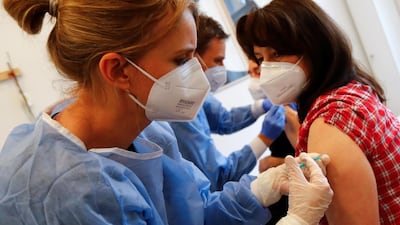Europe is entering a perilous phase in lifting coronavirus restrictions, scientists have said.
This is because the risk of new Covid-19 variants is at its highest at the current stage of the vaccine drive, researchers said.
Strains that can evade existing vaccines are more likely to thrive while other variants are being suppressed by shots.
Researchers found that a country where 60 per cent of the population is vaccinated was the most likely birthplace of such a mutant.
This is about the level of vaccination in most of Europe, with restrictions eased in many countries and scrapped almost entirely in England.
With cases growing in countries such as France and Germany, spurred by the rise of the Delta variant, a dangerous strain is more likely to take hold once it emerges.
As a result, politicians should consider keeping Covid-19 restrictions in place until vaccines are doled out to everyone, experts at Austria’s Institute of Science and Technology said.
“What our model showed is that when most people are vaccinated, the vaccine-resistant strain has an advantage over the original strain,” said Simon Rella, the co-author of the study published in the journal Nature.
“This means that the vaccine-resistant strain spreads through the population faster than the original strain at a time when most people are vaccinated.”
About 56 per cent of the population is fully vaccinated in Britain, where the government defied scientific scepticism to lift most restrictions in England on July 19.
The UK's devolved governments have their own health policies.
Ministers said the expected high infection rate could be tolerated because the vaccines would limit the number of hospital admissions and deaths.
But the study said that a high level of transmission made it more likely that a new variant would take hold in the population.
By contrast, when cases are low, a new variant may arise but harmlessly become extinct because it has nowhere to spread.
While the UK has seen a fall in cases over the past week, infections are still high, causing chaos in the economy because of the numbers of people being told to isolate.
A weekly epidemiological survey by the UK's Office of National Statistics cast doubt on the apparent drop in cases. It showed infection level continuing to rise in England.
Responding to the vaccine study, vaccine expert Dr Peter English suggested that ministers should seek to cut infection rates in this critical period.
“Allowing high rates of transmission at this time means that fully vaccinated people are more likely to be infected,” he said.
“This means that vaccine escape variants are more likely to arise and spread, undermining the value of the vaccination programme.”

Much of Europe is grappling with the rise of the Delta variant, which is more transmissible than other strains but is still defeated by existing vaccines.
There are concerns that variants such as Beta – cited by Britain for its travel restrictions on France – could partially evade the current vaccines.
Fyodor Kondrashov, a study co-author, said he hoped a vaccine-resistant variant would not emerge but urged caution in lifting restrictions.
“Evolution is a very powerful force and maintaining some reasonable precautions throughout the whole vaccination period may actually be a good tool to control this evolution,” he said.
In countries such as Germany and France, many restrictions were lifted after a third wave subsided but some measures remain in place.
With vaccine uptake slowing in Europe and the US, governments are trying to persuade their unprotected citizens to be inoculated.
The question of whether to penalise the unvaccinated by denying them entry to certain venues has sparked division and protests in parts of Europe.
Outside Europe, many poorer countries do not have enough vaccines.
Countries with low vaccine coverage are also vulnerable to new variants, as was seen by the spread of the Alpha variant in Britain late last year.


